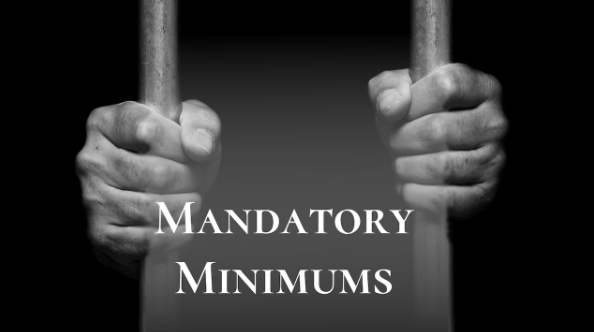There is no question that America suffers from ridiculous mass incarceration rates. Countless factors have led to this problem, but one underlying contributor is the mandatory minimum sentences that have been put in place for drug-related felonies and misdemeanors. Conversations surrounding mass incarceration and unfair sentences for drug offenders have become popular again due to Kamala Harris stepping up as the presumptive Democratic nominee and her past of serving as California’s attorney general.
America has been trying to combat injustice in our judicial system for years; both sides of the political spectrum consistently agree that mandatory sentences are a flaw in this system and do much more harm than good. It has been shown repeatedly that taking small steps to mitigate the damage done by them only goes so far, and there is only one solution left—to repeal all mandatory minimum sentences for non-violent drug crimes in every state and allow judges to tailor sentences on a case-by-case basis.
Source: The Spectator
Previous Legislation
Ever since the Anti-Drug Abuse Act of 1986 was passed by Congress and signed into law by former president Ronald Reagan, politicians have proposed multiple different bills aimed at combatting the negative effects that have come from the mandatory minimum drug sentences that were first introduced by the act. The original intention of the Anti-Drug Abuse Act was to protect Americans from the dangers of drug addiction. However, it ultimately resulted in nonviolent drug offenders serving disproportionately long sentences with very few opportunities for early release.
Some more recent legislation aimed at fixing the problems created by drug-related mandatory minimum sentences include:
The Fair Sentencing Act of 2010
This act reduced the disparities between crack and cocaine sentencing. Before this legislation, 5kg of cocaine would result in a minimum 10-year sentence while 5g of crack resulted in a minimum 5-year sentence. When the new mandatory minimum threshold for crack cocaine-related offenses was raised from 50g to 280g, the number of people specifically being convicted for at and above 280g spiked. This is often cited as evidence for prosecutors having an incentive to charge offenders with the mandatory minimum for the crime committed.
The First Step Act of 2018
Signed into law by former president Donald Trump, this act aimed to promote rehabilitation, lower recidivism rates, enhance judicial discretion, and reduce excessive sentences. This was favored by both parties and allowed for defendants with limited criminal records to serve lower than the mandatory minimum for their crimes.
Mandatory Minimum Reform Act of 2017
This Act was introduced in the House on September 14th, 2017, and would have eliminated all mandatory minimum sentences for non-violent federal drug crimes. However, the bill was referred down through several subcommittees and has not seen any other actions since. It aimed to eliminate most mandatory minimum prison sentences for several different types of non-violent drug charges and would have required written approval from an Attorney General when prosecuting a person of a low-level drug crime.
Bipartisanship
While previous acts have led to improvements in sentencing, the fact still stands that mandatory minimums for non-violent drug-related crimes still leave room for corruption and loopholes in our legal system. The majority of Americans agree that these mandated minimums result in unfair sentences, deprive judges of their discretion, and contribute to our growing prison population. In a country that is so divided by political party, the bipartisanship on this issue feels almost unprecedented with 83% of Democrats and 66% of Republicans believing that mandatory minimum sentences for non-violent drug crimes should be eliminated completely. While the right is mainly concerned with the high costs that come from keeping so many people imprisoned, the left tends to focus on racial disparities in sentences and the dehumanization of offenders. Overall, the biggest agreement between Democrats and Republicans is that mandatory minimums are simply ineffective. Longer sentences for drug offenders do not keep us safer or keep them from reoffending.

The Next Step
Repealing these mandatory minimum sentences will not let drug offenders go unpunished, but will instead further strengthen our judicial system and allow space in the courts for reason and true judicial discretion. States that have already repealed drug mandatory minimums, such as Rhode Island, New York, and Michigan, have since been benefiting from lowered crime and recidivism rates. Eliminating mandatory minimums nationally for drug crimes will give judges the ability to create sentences on a case-by-case basis. Instead of trusting the court’s power and traditional sentencing guidelines to determine exactly what a person is guilty of and what they should serve, mandatory minimums work systematically and only go by numbers—which can not always be ensured as accurate. Prosecutors and police officers have the power to bunch, or round up, the amount of a drug that a person is found in possession of so that it reaches the amount that mandates a minimum sentence. This allows for circumstances where low-level offenders can be charged with trafficking or distribution and forced to serve an unfit sentence. True justice is fair and abides by the fact that every case has its unique circumstances. The American people are ready and willing to create big changes; it is time that we push for our elected officials to create reform in our courts and eliminate mandatory minimum sentences for drug-related crimes.
Works Cited
American Enterprise Institute. 10 Feb. 2014, www.aei.org/multimedia/mandatory-minimum-sentences/.
Brennan Center for Justice. 18 Oct. 2021, www.brennancenter.org/our-work/analysis-opinion/end-mandatory-minimums#:~:text=All%2050%20states%20and%20DC,underlies%20mandatory%20minimums%20is%20dehumanization.
Congress.gov. www.congress.gov/bill/115th-congress/house-bill/3800/text.
Congressional Research Service. 5 July 2024, crsreports.congress.gov/product/pdf/LSB/LSB11037.
Congressional Research Service. 11 Jan. 2018, crsreports.congress.gov/product/pdf/R/R45074.
United States Sentencing Commission. www.ussc.gov/sites/default/files/pdf/research-and-publications/backgrounders/RG-drug-mm.pdf.
United States Sentencing Commission. Oct. 2017, www.ussc.gov/research/research-reports/mandatory-minimum-penalties-drug-offenses-federal-system.
Yale Department of Economics. 19 Oct. 2019, economics.yale.edu/sites/default/files/tuttle_mandatory_minimums.pdf.

Angelina Pereira is a rising high school senior from Rhode Island. She is passionate about politics, with a specific interest in the legislative process, and hopes to become a lawmaker one day. Angelina is the founder of her school’s Model Legislature delegation and has been actively involved in the program since her freshman year. She has participated in its mock General Assembly at Rhode Island’s state house and spends her time writing bills. Angelina is an advocate of civic engagement in youth and aims to bridge political divisions.


Leave a Reply